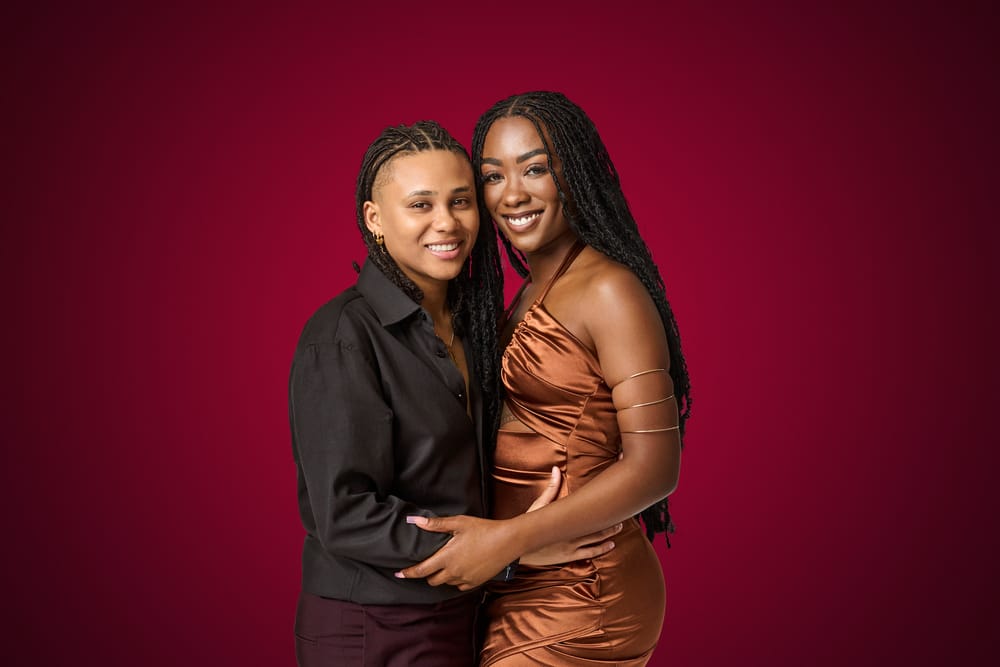Have you ever seen yourself on a reality show? Like really saw yourself in a cast member and thought, "what an asshole I am?" At one point, I thought everyone would have this experience. Because we are, effectively, always on camera. We are "main characters" and completing our own side quests and hero’s journeys. We are in social media videos, on the periphery or in the spotlight. We are featured players on the endless scroll. Whether dreadful or celebrated, clips of us exist to be searched, scrutinized, revealed.
I'm watching The Ultimatum: Queer Love, Season 2, and have seen myself. Embarrassed for 28-year-old me, I watch A.J., the queer Black woman with her head shaved on the side. She's stringing along Britney, the beautiful entrepreneur who's issued her the ultimatum. Classic Flatbush fuckboy behavior, in any form.
Marry me! (Or else!)
But it's a fuckboy's job to take this bet and call the bluff. A.J. has Britney dead to rights and yet, her charms seem so trite and corny to me. She's heavy on 'you are my world' and 'I feel this amazing spark with you' talk on every first date. It’s the predictive text of flirting, pre-selected clauses strung together for common effect. The coupled women don't clock this, at first, as they've opted into their own humiliating reality show fantasy. But the discerning viewer rolls their pupils like a Holy Ghost slot machine when she talks.
I know they're like half my age, without the benefit (and gravity) of experience. I'm about twice their age without the vigor (and folly) of youth. Still, I roll my eyes at A.J.'s line delivery because I wonder, 'Are we really like this?' I'm considering men, and those who present as masculine, who sign up for the eternal chase. We drum up all manner of skullduggery in the name of true demon time. A.J. is in this for ass, and her eyes light up during the first date round robin confessional. As the viewer, I am a plus-one to her vainglorious excitement. There's a devilish A.J. slip when she lies about buying a house—it’s almost Freudian—while trying to relate to her eventual trial marriage partner, Marie. Britney bought the house; she's a sidecar to Britney's ambition. That inner shame tells all though. I know I've been this kind of tricky dick, so I grin and grimace and smh. When did the game get this cold? This obvious? Or maybe screens have set what always was to a luminous blue buzz.
Rather than see her as me, I'm first inclined to judge, which is the point of every one of these shows. I will play out the accusations of deceit, the tearful ex, the night-vision footage of cheating, in my head. I will declare what's fair play and not, quietly judging my own past and projecting onto these young contestants. Then, I'll sit in my grief and reflect.
Remember when you were "helping" your ex with her business by living in her house rent-free, using the business credit card to buy "work clothes" for her real estate venture?
Remember when you thought it wise to join a writing group a block away from your old girlfriend to meet the new girlfriend? Or when you got so drunk you brought the side girlfriend to the new girlfriend’s poetry event and introduced them to one another with “wife meet ex-wife”?
Fortunately for you, no one had their front-facing phone camera out. They didn’t exist.
No cottage industry of reality stars or social media shame-hounds existed either. Count yourself lucky.
But I’m drawn to A.J. Not just because of our shared geography—thousands of New York Caribbean millennial children do not go on to become reality stars or media loving writers—but because of her dour, doe-eyed looks. Her scheming for love more resembles desperation and then anxiety as the season marches on.
That’s intricately linked to her femme partner, Britney, whose eyes swat away most others, but fixate on A.J. Their mutual conquest of each other, their dogged obsession shows me what love is made of, young or old. And I’m not gonna lie, I want more of that.
I have been watching AI videos (more essays on this later) that deaden me a little more inside each time I play one. When I think of reality shows and their original reason for being, I can’t help but think of how far we’ve come to the soulless fake video era. I may not love Marita’s narcissism or Mel’s put-upon vulnerability wrapped in deceit. I don’t adore Britney’s fake lashes or A.J.’s polyamorous Brooklyn lesbian coded fade. But they’re all undeniably, imperfectly human. They traffic in the trite and maybe misuse therapy-speak in one giant uncocked trigger. (For the first time, every single cast member “feels seen” by their new belle.) But that’s pretty funny when you think about it: that human love is so irrational and predictably erratic that we’ll watch shows about strangers making the same mistakes we made. In my case, their mistakes are orders of magnitude less costly.
I just want humanity to have time like this forever. Time to waste on laying in bed, lying on lovers, leaving the bathroom door open during a honeymoon phase. I want the profit machine that recognizes our addiction to seeing ourselves fail and celebrating to keep producing stories with no plot, with impulsive choices made for the plot. I want to watch our beautifully harmless brushes with infamy dissolve like so many scene transitions set to absurdly on-the-nose lyrics. The alternative—a defiant, beguiling machine love—is a lot worse.
This post originally appeared on Substack and is edited and republished with author's permission. Read more of Andrew Ricketts' work on Substack.
